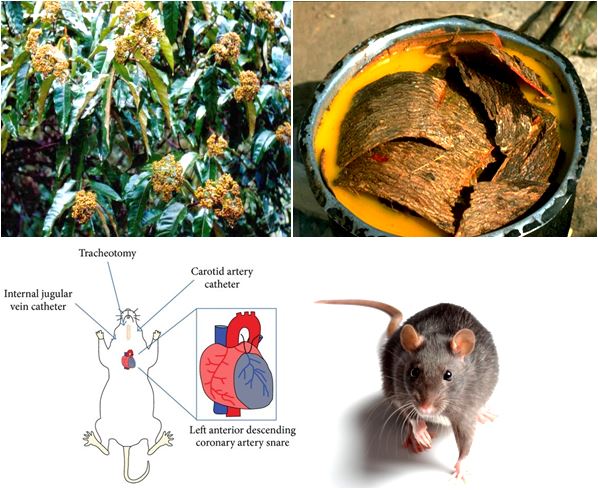MYOCARDIAL POTENCY OF AQUEOUS EXTRACT OF HARUNGANA MADAGASCARIENSIS STEM BARK AGAINST ISOPROTERENOL-INDUCED MYOCARDIAL DAMAGE IN RATS
Keywords:
Antioxidants, electrocardiography, Harungana madagascariensis, isoproterenol, myocardial infarctionAbstract
Objectives: The present study was undertaken to evaluate the effects of Harungana madagascariensis on electrocardiographical, biochemical and histopathological changes in isoproterenol (ISO)-induced myocardial infarction in rats.
Methods: Male Wistar albino rats were randomly divided and treated with the aqueous extract of Harungana madagascariensis stem bark (AEHM, 200 and 400 mg/kg per os), or normal saline or vitamin E for 7 days with concomitant administration of ISO (85 mg/kg, subcutaneously) on 8th and 9th days, at 24 h interval.
Results: The ISO injections to the rats caused cardiac dysfunction evidenced by a marked (P<0.01) elevation in ST-segment, a reduction in R wave amplitude (P<0.01), decrease in endogenous antioxidant reduced glutathione (GSH), increase in malondialdehyde (MDA), a lipid peroxidation marker, increase of cardiac marker enzymes lactate dehydrogenase (LDH), aspartate amino transferase (AST) and alanine amino transferase (ALT). All these changes in cardiac function as well as GSH, MDA and the enzymes (LDH, AST and ALT) were ameliorated when the rats were pretreated with AEHM. Additionally, the protective effects were strengthened by improved histopathological changes, which specify the protection of cardiomyocytes from the deleterious effects of ISO.
Conclusion: This study demonstrates the cardioprotective effect of Harungana madagascariensis on isoproterenol-induced myocardial infarction in rats. The mechanism might be associated with the enhancement of antioxidant defense, reduction of lipid peroxydation and it is confirmed by amending electrocardiographic pattern, improvement of cardiac markers and less histopathological damages following ISO-induced myocardial infarction. It could provide experimental evidence to support the use of Harungana madagascariensis used in traditional medicine to treat cardiovascular disorders.
Peer Review History:
Received 9 December 2017; Revised 22 January; Accepted 28 February, Available online 15 March 2018
Academic Editor: Dr. Ahmad Najib , Universitas Muslim Indonesia, Indonesia, ahmad.najib@umi.ac.id
, Universitas Muslim Indonesia, Indonesia, ahmad.najib@umi.ac.id
Reviewer(s) detail:
Dr. Mohamed Said Fathy Al-Refaey , University of Sadat City, Menofia, Egypt, Mohamed.said@fop.usc.edu.eg
, University of Sadat City, Menofia, Egypt, Mohamed.said@fop.usc.edu.eg
Dr. Mohamed Salama , Modern University for Technology & Information, Egypt, salama47@yahoo.com
, Modern University for Technology & Information, Egypt, salama47@yahoo.com
Downloads

Published
How to Cite
Issue
Section

This work is licensed under a Creative Commons Attribution-NonCommercial 4.0 International License.










 .
.